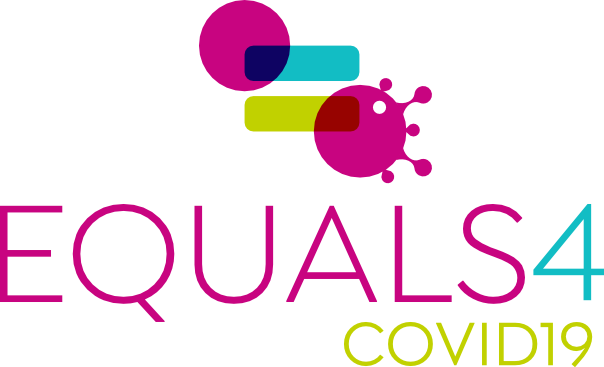Equidade em saúde em tempos de pandemia: avaliação de impacto na saúde mental e bem-estar da população brasileira e cabo-verdiana em Portugal
Investigador
O projeto EQUALS4COVID19 visa avaliar o impacto da pandemia COVID-19 na saúde mental e no bem-estar físico, mental e social da população imigrante em Portugal, e, em particular, de indivíduos jovens, adultos e adultos maiores-idosos com nacionalidade brasileira e cabo-verdiana e residentes nos distritos de Lisboa, Faro, Porto e Setúbal, incluindo os indivíduos que estavam/estiveram em quarentena ou isolamento, por infeção ou suspeita, tendo em conta diversos fatores, desde a ansiedade, a depressão e a resiliência, a fatores relacionados com a conciliação trabalho-família, o suporte social percebido, a situação face ao trabalho e o rendimento financeiro e expectativas face ao futuro. Tem como objetivos específicos e para os subgrupos populacionais em termos de nacionalidade, género, grupo etário, e distrito em estudo: 1. Identificar os fatores modificáveis de proteção ou de fragilização da saúde mental em contexto pandémico; 2. Caracterizar o acesso percebido aos serviços de saúde e a medidas de proteção individual; 3. Produzir recomendações para a política pública de integração de imigrantes NPT e de requerentes de asilo e boas práticas para a capacitação dos profissionais de saúde enquanto agentes privilegiados da promoção da saúde mental e do bem-estar no respeito pela diversidade individual e cultural.
Informação do Projeto
2021-09-01
2023-05-31
Parceiros do Projeto
- CIES-Iscte
- AIDFM - Líder (Portugal)
Fecundidade, Imigração e Aculturação: Abordagem interseccional das experiências e expectativas de sexualidade e reprodução em Famílias Cabo-verdianas e Portuguesas
Investigador
CONTEXTO: O estudo das relações entre imigração, aculturação e fecundidade é recente, existindo ainda lacunas, em particular quanto às condicionantes socioculturais da fecundidade. Face ao declínio da fecundidade em Portugal, associado às mudanças estruturais do país nas últimas décadas, e perante o reconhecimento da importância da imigração para o aumento da natalidade, o projeto FEMINA foi desenhado para avaliar os fatores complexos de ordem individual, social, cultural e económica que determinam as experiências e expectativas de saúde sexual e reprodutiva (SSR) em famílias Cabo-verdianas e Portuguesas. O projeto reúne a expertise de investigadores do CIES-IUL e do ISAMB-FMUL nas áreas das Migrações, Família e Desigualdades em Saúde, visando uma abordagem compreensiva e interseccional de uma SSR promotora de segurança e satisfação. OBJETIVOS: A principal questão de investigação (QI) ("Qual é a influência da imigração e da aculturação dos imigrantes nas desigualdades em SSR em Portugal?") gerou várias QI subsidiárias: 1. Quais as diferenças entre os níveis e padrões de fecundidade nas (e entre as) mulheres portuguesas e cabo-verdianas? 2. Quais os fatores sociodemográficos (incluindo indicadores de etnicidade) associados à SSR de mulheres e homens portugueses e cabo-verdianos? 3. Quais as diferenças entre as práticas atuais e espectativas futuras relativas à SSR de mulheres e homens portugueses e cabo-verdianos? 4. Que crenças culturais e práticas de mulheres e homens portugueses e cabo-verdianos estão associados a uma melhor SSR e melhor utilização dos cuidados de SSR? 5. Quais as opiniões e valores de peritos e stakeholders relativamente a adaptar os serviços de SSR às populações immigrantes? 6. Como podem os serviços de SSR ser mais abertos à integração dos conhecimentos e práticas das culturas de origem dos imigrantes? MÉTODOS: Para responder a estas QI, foi desenvolvida uma abordagem multimétodo com recolha de dados quantitativos e qualitativos a nível individ...
Informação do Projeto
2018-10-01
2022-09-30
Parceiros do Projeto
- CIES-Iscte
- AIDFM - (Portugal)
Promoção da Cidadania e Direitos Sexuais em Populações Imigrantes em Portugal: coprodução de recomendações e boas práticas para a redução de desigualdades sexuais e reprodutivas
Investigador
O projeto visa contribuir para a integração das populações imigrantes em Portugal através da promoção da Saúde Sexual e Reprodutiva (SSR) numa abordagem integrada de saúde e direitos humanos. Primeiro, será desenvolvida uma revisão de literatura para mapear a evidência científica existente. Segundo, será realizado um painel Delphi para a obtenção de consenso sobre boas práticas de cuidados de SSR com populações imigrantes, com três rondas e um mínimo de 75 peritos de diversos setores (Academia, Organizações Não-Governamentais, Político, Saúde e Organizações da Sociedade Civil), permitindo a coprodução de recomendações para reduzir as desigualdades sexuais e reprodutivas. Serão ainda desenvolvidas ações de informação para promover os direitos sexuais e reprodutivos das populações imigrantes e desenhadas ações de formação para capacitar os profissionais de saúde e promover alterações estruturais neste domínio.
Informação do Projeto
2018-10-01
2020-07-31
Parceiros do Projeto
- CIES-Iscte
- AIDFM - Líder (Portugal)
Estudo sobre a empregabilidade dos estudantes do Camões IP nos países africanos
Investigador
Informação do Projeto
2017-12-14
2018-09-30
Parceiros do Projeto
- CIES-Iscte - Líder
Edições bilingues do Novo Atlas da Língua Portuguesa
Investigador
Informação do Projeto
2017-12-01
2018-03-31
Parceiros do Projeto
- CIES-Iscte - Líder
Informação do Projeto
2015-12-24
2016-06-30
Parceiros do Projeto
- CIES-Iscte - Líder
Informação do Projeto
2013-04-01
2013-12-31
Parceiros do Projeto
- CIES-Iscte - Líder
Observatório de Trajectos dos Estudantes do Ensino Secundário
Coordenador Global
O Observatório de Trajectos dos Estudantes do Ensino Secundário (OTES) é uma plataforma permanente de investigação sobre os trajectos sociais, escolares e profissionais dos estudantes do ensino secundário em Portugal. A metodologia do OTES consiste na aplicação anual de inquéritos por questionário a amostras alargadas de alunos de escolas secundárias em todo o país. Além de servirem finalidades de investigação fundamental no domínio da educação e dos processos de recomposição social, os dados produzidos pelo OTES destinam-se a apoiar processos de tomada de decisão no âmbito das políticas públicas.
Informação do Projeto
2010-11-11
2011-12-10
Parceiros do Projeto
- CIES-Iscte - Líder
A construção de um Arquivo de Dados em Ciências Sociais
Investigador
O projecto pretende criar um Arquivo de Dados em Ciências Sociais que reúna e organize a informação sobre a sociedade portuguesa resultante da aplicação de inquéritos ou de estudos à opinião pública realizados pela comunidade académica em geral.
Informação do Projeto
2010-03-01
2013-03-30
Parceiros do Projeto
- CIES-Iscte
- ICS/UL - Líder (Portugal)
- CESNOVA - (Portugal)
- CEG/FL/UL - (Portugal)
FLY 1900-1974 (Cartas Esquecidas: Anos 1900 a 1974)
Investigador
O projecto pretende publicar on-line e estudar de forma interdisciplinar um corpus de documentos do século XX da autoria de gente vulgar. Trata-se de uma amostra de 2.000 cartas extraídas de um universo de milhões de missivas.
Informação do Projeto
2010-01-04
2013-07-03
Parceiros do Projeto
- CIES-Iscte
- CLUL - Líder (Portugal)
Observatório das Desigualdades
Investigador
O Observatório das Desigualdades é uma plataforma de recolha, sistematização, investigação, difusão e debate de dados e análises sobre desigualdades sociais contemporâneas, numa perspetiva multidimensional: desigualdades de rendimentos e emprego, de habilitações escolares, qualificações e competências, de classe social, género, étnico-raciais ou etárias, na saúde, habitação, práticas culturais, utilização de novas tecnologias da informação e comunicação, entre outras. Os progressos verificados ao longo das últimas décadas na sociedade portuguesa, a múltiplos níveis, não impediram a persistência de formas tradicionais de desigualdade, enquanto outras surgiram ou tornaram-se mais visíveis e intoleráveis. Além disso, no mundo atual têm cada vez mais importância as desigualdades globais e as suas relações com as desigualdades nacionais ou locais. As desigualdades, por outro lado, não são só parâmetros estruturais das sociedades, mas também objeto de ação individual e coletiva, nomeadamente de movimentos sociais e políticas públicas, com consequências variadas na redução ou acentuação das desigualdades sociais. O Observatório toma todos estes aspetos das desigualdades sociais como objeto da sua atividade. Para além de promover a difusão de informação e o conhecimento científico sobre desigualdades sociais, contribui para o debate público e para a fundamentação e avaliação de políticas públicas com incidências nas desigualdades sociais. A concretização destes objetivos faz-se por meio de um conjunto de instrumentos e atividades, com destaque para o sítio eletrónico “Observatório das Desigualdades”, incluindo também um sistema de indicadores, o aprofundamento de conceitos e métodos, a promoção de conferências, debates e publicações, assim como a realização de projetos de investigação e estudos especializados sobre o tema. O Observatório das Desigualdades é uma estrutura independente constituída no quadro do Centro de Investigação e Estudos de Sociologia (CIES-IUL) do Insti...
Informação do Projeto
2008-10-17
--
Parceiros do Projeto
- CIES-Iscte - Líder
- IS-UP - (Portugal)
- CES-UA - (Portugal)
Imigrantes Idosos: Uma Nova Face da Imigração em Portugal
Coordenador Global
O prolongamento do calendário migratório, e consequente desdobramento dos ciclos de vida familiar e individual de uma parte dos imigrantes fixados em Portugal, gerou uma nova categoria de população residente que começa a ter expressão quantitativa e sobre a qual muito pouco ou nada se sabe. Trata-se dos imigrantes idosos, isto é, pessoas que hoje têm 65 ou mais anos e que imigraram para Portugal há três ou quatro décadas. O estudo visa conhecer a situação social e as trajectórias de vida destes imigrantes, nomeadamente, as suas condições socioeconómicas e as suas vivências familiares e profissionais, actuais e passadas, bem como as suas sociabilidades, identidades e expectativas. O estudo terá uma dimensão extensiva, mais breve, de avaliação estatística e caracterização geral do fenómeno do envelhecimento dos imigrantes, e uma dimensão mais desenvolvida de natureza qualitativa, baseada em entrevistas em profundidade a diferentes perfis-tipo de imigrantes idosos.
Informação do Projeto
2008-09-01
2008-12-31
Parceiros do Projeto
- CIES-Iscte - Líder
O Valor Económico da Língua Portuguesa
Investigador
Este projecto visa determinar o valor económico directo da língua portuguesa (actual e potencial) no contexto contemporâneo de globalização, nomeadamente em actividades económicas e empresariais nos domínios do ensino, da cultura e da comunicação que envolvem o uso do português.
Informação do Projeto
2008-02-15
2009-03-01
Parceiros do Projeto
- CIES-Iscte - Líder
Projecto Geração - Investigação dos Caminhos Juvenis de Integração e Exclusão Social: Trajectórias de Vida dos Jovens de Casal da Boba
Coordenador Global
O Projecto visa contribuir para que as crianças e os jovens do bairro "Casal da Boba", que apresentam sinais graves de exclusão, possam desenvolver e prosseguir projectos de vida de integração na sociedade.
Informação do Projeto
2007-10-04
2008-08-30
Parceiros do Projeto
- CIES-Iscte - Líder
Os Estudantes e os seus Trajectos no Ensino Superior: sucesso e insucesso, factores e processos, promoção de boas práticas
Investigador
Os objetivos do projeto foram identificar e analisar percursos-tipo de sucesso, insucesso e abandono dos estudantes no ensino superior, relacionando-os com parâmetros estruturais e institucionais, e procurando encontrar fatores explicativos e identificar boas práticas. O projeto teve âmbito nacional e englobou os diversos subsistemas do ensino superior. A análise desenvolveu-se a três níveis: estrutural, institucional e biográfico, recorrendo a fontes estatísticas, inquéritos extensivos, documentação institucional e entrevistas em profundidade. O projeto inseriu-se no programa “Promoção do Sucesso Escolar e Combate ao Abandono e ao Insucesso no Ensino Superior”, do MCTES, e foi financiado pela FCT. A equipa de investigação foi constituída com base num consórcio entre o CIES-IUL (ISCTE-Instituto Universitário de Lisboa) e o ISFLUP (Universidade do Porto), contando com a colaboração de diversas instituições do ensino superior e associações de estudantes.
Informação do Projeto
2007-05-14
2008-06-15
Parceiros do Projeto
- CIES-Iscte
- IS-UP - Líder (Portugal)
Novos Contextos das Migrações: Quando a Origem se Transforma no Destino…
Investigador
Esta conferência internacional reunindo especialistas nacionais e internacionais na matéria, pretende analisar comparativamente a natureza, o desenvolvimento e o impacto das correntes migratórias debatendo as perspectivas da origem e do destino, o teórico e o prático, num marco comparado entre os países da Europa do Sul.
Informação do Projeto
2006-10-09
2006-10-09
Parceiros do Projeto
- CIES-Iscte - Líder
Levantamento Bibliográfico sobre Imigração e Minorias Étnicas (2000-2006)
Coordenador Global
Trata-se de um levantamento bibliográfico de documento sobre imigração e minorias étnicas, com referência empírica à sociedade portuguesa, publicados no período de 2002-2006.
Informação do Projeto
2006-03-03
2006-05-01
Parceiros do Projeto
- CIES-Iscte - Líder
Crianças e Jovens em Risco de Exclusão Social no Bairro de Casal da Boba (Amadora) - Projecto de avaliação de acompanhamento
Coordenador Global
Contribuir, de forma teórica e empiricamente fundamentada, para a auto-correcção permanente do projecto de intervenção, promovendo a reflexão crítica dos actores envolvidos no que se refere a objectivos, acções e resultados.
Informação do Projeto
2005-11-16
2009-12-31
Parceiros do Projeto
- CIES-Iscte - Líder
Do Fado ao Tango: Emigração e Emigrantes Portugueses na Região Platina
Investigador
Este projecto visa investigar a estrutura e características da emigração portuguesa para a região Platina (região pampeana e litoral na Argentina, Uruguai e estados do Sul do Brasil). O Desenho do estudo inclui, por um lado, a recolha de informação relativa a fluxos, políticas e redes migratórias, bem como a sistemas legais e institucionais de apoio aos emigrantes. Por outro lado, pretende-se desenvolver uma caracterização sociológica das comunidades existentes em torno de duas dimensões fundamentais: padrões demográficos e socio-profissionais e formas e identidades culturais.A metodologia a adoptar inclui uma componente forte de análise documental (estatísticas, legislação, documentação oficial, arquivos públicos e privados, etc?) complementado com um inquérito às associações de emigrantes e realização de histórias de vida.
Informação do Projeto
2004-09-01
2006-12-31
Parceiros do Projeto
- CIES-Iscte - Líder
Jovens Descendentes de Migrantes Africanos em Portugal: Transição para a Integração ou para a Exclusão Social?
Coordenador Global
Este projecto visa conhecer a situação social da chamada segunda geração, mais especificamente daqueles que estão na faixa etária jovem (15-29 anos), no sentido de saber se a sua transição para a vida adulta prefigura quadros futuros de integração ou de exclusão social.
Informação do Projeto
2003-06-16
2005-10-31
Parceiros do Projeto
- CIES-Iscte - Líder
Immigrants and Ethnics Minorities in European Cities: Life-courses and Quality of Life in a World of Limitations
Coordenador Local
Estudo comparativo sobre trajectos e situação social de 12 populações imigrantes em cidades europeias de 6 paises.
A Cultura-Escola Glocal: o Diferencialismo da Multiculturalidade para Todos
Coordenador Global
Este projecto perspectiva-se sob a forma de uma abordagem multipolarizada à temática das estratégias educativas face à questão da "multiculturalidade".
Informação do Projeto
2001-05-01
2002-08-30
Parceiros do Projeto
- CIES-Iscte - Líder
A Modernização das Estruturas Sociais
Investigador
Pretende-se com este projecto colmatar significativas lacunas de conhecimento que se verificam a propósito de uma questão tão decisiva como é a dos processos de modernização da sociedade portuguesa contemporânea. O objectivo central é proceder a uma análise sociológica, elaborada no plano teórico e solidamente suportada no plano da evidência empírica, dos processos de reconfiguração das estruturas sociais que atravessam actualmente a sociedade portuguesa.
Informação do Projeto
1997-05-15
2000-11-30
Parceiros do Projeto
- CIES-Iscte - Líder
Competitividade e Exclusão Social: as Áreas Metropolitanas de Lisboa e Porto
Investigador
Com este projecto procuramos, através da análise comparativa das duas principais áreas metropolitanas portuguesas (Lisboa e Porto), analisar os processos em curso de alteração dos factores de competitividade e de emergência de sistemas territoriais de inovação com as recomposições sociais que lhes estão associadas, bem como os processos de produção/reprodução de novas formas de exclusão social.
Informação do Projeto
1997-03-01
2000-12-30
Parceiros do Projeto
- CIES-Iscte - Líder
- Dinâmia-ISCTE-IUL - (Portugal)
- IS-UP - (Portugal)

 English
English




